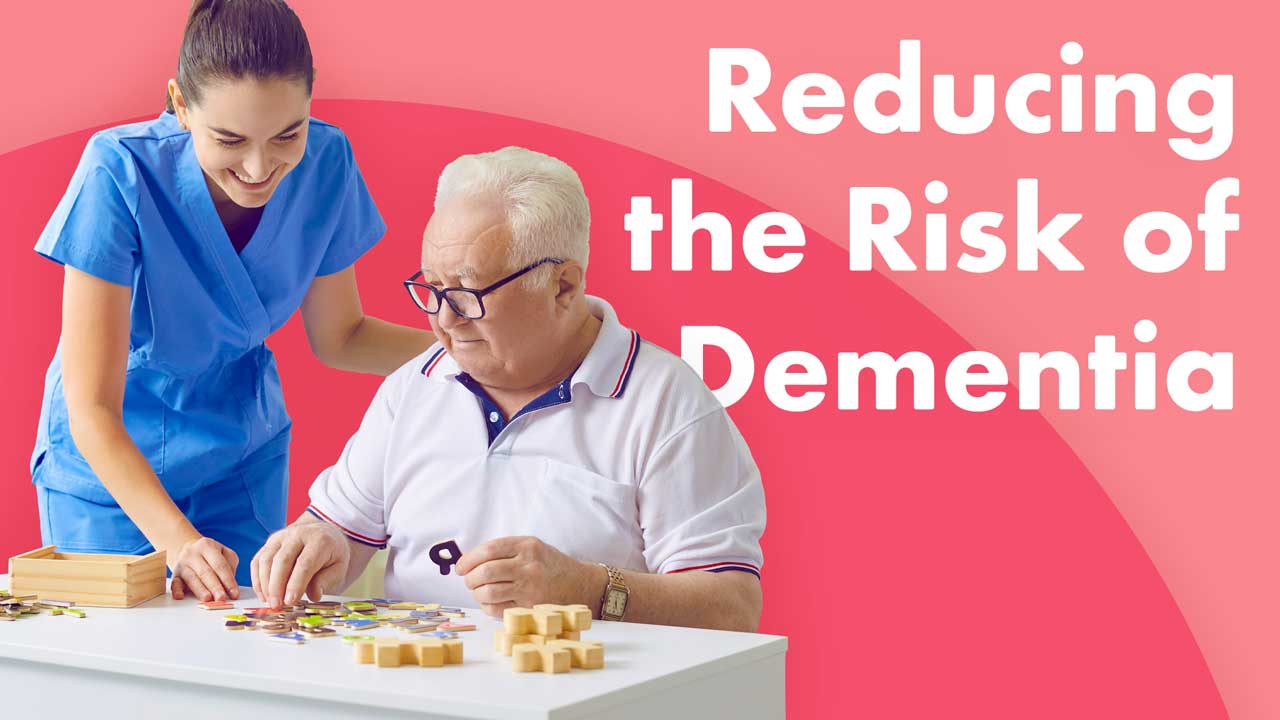Is there any way to completely prevent dementia? The answer, sadly, is no (Dementia Australia 2017a).
However, by managing the risk factors of dementia, it is possible to decrease the likelihood of developing it (Dementia Australia 2017).
In order to reduce the risk of dementia, it is important to adopt a ‘brain-healthy’ lifestyle from middle age, when changes in the brain may begin to occur. Even if there are no immediately noticeable changes during middle age, they may still be occurring - dementia symptoms sometimes take decades to appear (Better Health Channel 2014).
It is possible to improve brain function at any age, so it is never too early or too late to adopt a brain-healthy lifestyle (Better Health Channel 2014).
Non-Modifiable v Modifiable Risk Factors
The risk factors for dementia are unique for every individual (Dementia Australia 2017b).
There are two types of risk factors:
Non-modifiable risk factors cannot be altered. These include:
- Older age
- Genetics
- Family history of dementia
(Dementia Australia 2017b)
Age is the biggest risk factor for dementia, with 1 in 10 adults over 65 and 3 in 10 older adults over 85 affected by Alzheimer’s disease (Healthdirect 2022).
Modifiable risk factors, on the other hand, can be altered by making lifestyle changes. Research suggests that managing modifiable risk factors may significantly contribute to a decreased or delayed risk of dementia (Dementia Australia 2017b).
Modifiable risk factors include:
- Mental activity
- Social activity
- Physical activity
- Alcohol
- Diet
- Blood pressure
- Bodyweight
- Cholesterol
- Diabetes
- Smoking
(Better Health Channel 2014)
Managing Modifiable Risk Factors
Mental Activity

Activities that involve mental stimulation are helpful in reducing the risk of dementia, particularly those that are complex and challenging. Regularly performing these activities allows new brain cells to be built and connections to be strengthened, meaning that the brain will still be able to cope even if brain cells die or are damaged (Better Health Channel 2014; Dementia Australia 2019a).
Helpful brain exercises include:
- Hobbies (e.g. painting, sewing, writing, reading)
- Taking short courses
- Jigsaw, word, or number puzzles
- Learning a new skill (e.g. dancing, playing a musical instrument, languages)
- Going to theatres, museums, movies, concerts, or galleries
- Playing card games or board games
(Better Health Channel 2014; Alzheimer’s Society 2021)
While depression can occur as a symptom of dementia, it appears that untreated depression may increase the risk of dementia in the first place. Depression may also lead to reduced participation in social activities and engagement with mentally stimulating activities, further contributing to the risk of dementia (NHS 2023).
Social Activity
Research has found that meaningful social interaction can help maintain brain health and even improve cognitive function. Interacting with others involves the engagement of several neural networks that allow information to be detected, decoded, and interpreted. This mental stimulation may help reduce cognitive decline and improve cognition over time (Charvat 2019).
Helpful social activities include:
- Dancing
- Travelling
- Volunteering
- Joining clubs
- Games nights with friends
- Catching up with friends and neighbors
(Better Health Channel 2014)
Physical Activity
Physical activity has several beneficial effects on the brain, including:
- Increased blood flow to the brain
- Stimulation of brain cell growth and connection
- Larger brain volume
(Dementia Australia 2019b)
Physical inactivity, on the other hand, is associated with an increased risk of cognitive issues related to memory and thinking. A lack of exercise also increases the risk of heart disease, obesity, and type 2 diabetes, which are all dementia risk factors (NHS 2023).
It’s suggested that adults should:
- Do physical activity every day
- Do strengthening activities focused on the legs, hips, back, abdomen, chest, shoulders, and arms at least two days per week
- Do either:
- At least 150 minutes of moderate-intensity activity per week (e.g. brisk walking, riding a bike, dancing, pushing a lawnmower), or
- 75 minutes of vigorous-intensity activity per week (jogging or running, walking up stairs, aerobics, sports)
- Limit the amount of time spent sitting or lying down and break up periods of being immobile with activity.
(NHS 2023)

Alcohol
Excessive alcohol consumption increases the risk of dementia, along with stroke, heart disease, and certain cancers. It is also associated with damage to the brain and nervous system (Alzheimer’s Society 2021; NHS 2020).
Adults should consume no more than 10 standard drinks per week and no more than 4 standard drinks on any single given day (DoH 2022).
Diet
Adults should maintain a healthy and balanced diet. They should eat:
- At least five servings of fruit and vegetables every day
- Protein at least twice every week
- Starchy foods (e.g. bread, potatoes, pasta)
- Six to eight glasses of fluid (mainly water) every day
(Alzheimer’s Society 2021)
Saturated fat, salt, sugar, and low-fiber foods should be limited, as they increase the risk of hypertension, high cholesterol, obesity, and type 2 diabetes. These conditions are all associated with a higher risk of dementia (NHS 2020).
Smoking
While the relationship between dementia and smoking is complex, there is a strong link between smoking and the risk of dementia.
- Smoking increases the risk of vascular system issues, which are associated with Alzheimer's disease and vascular dementia
- Smoking increases the risk of strokes or bleeds in the brain, which are risk factors for dementia
- Alzheimer's disease is associated with oxidative stress and inflammation, which can both be increased by cigarette toxins
- Smoking can cause the arteries to narrow, raising blood pressure and therefore increasing the risk of dementia
(Alzheimer’s Society 2017; NHS 2023)
Conclusion
While some risk factors of dementia cannot be modified, others can be altered by making lifestyle changes. It is important to remember that these changes can be made at any stage of life, and it is never too early or too late to become brain-healthy - however, it is recommended that people in their middle age consciously make healthy lifestyle choices in order to reduce the risk of dementia later in life.

Test Your Knowledge
Question 1 of 3
Which one of the following is a non-modifiable risk factor?
Topics
References
- Alzheimer’s Society 2021, How to Reduce Your Risk of Alzheimer's and Other Dementias, Alzheimer’s Society, viewed 13 October 2023, https://www.alzheimers.org.uk/about-dementia/risk-factors-and-prevention/how-reduce-your-risk-dementia
- Alzheimer’s Society n.d., Smoking and Dementia, Alzheimer’s Society, viewed 13 October 2023, https://www.alzheimers.org.uk/about-dementia/risk-factors-and-prevention/smoking-and-dementia
- Department of Health and Aged Care 2022, How Much Alcohol is Safe to Drink?, Australian Government, viewed 13 October 2023, https://www.health.gov.au/topics/alcohol/about-alcohol/how-much-alcohol-is-safe-to-drink
- Better Health Channel 2014, Dementia - Reducing your Risk, Victoria State Government, viewed 13 October 2023, https://www.betterhealth.vic.gov.au/health/ConditionsAndTreatments/dementia-reducing-your-risk
- Charvat, M 2019, ‘How Social Interaction May Prevent Dementia’, Psychology Today, 25 April, viewed 13 October 2023, https://www.psychologytoday.com/au/blog/the-fifth-vital-sign/201904/how-social-interaction-may-prevent-dementia
- Dementia Australia 2019b, Look After Your Body, Dementia Australia, viewed 13 October 2023, https://www.dementia.org.au/information/risk-reduction/look-after-your-body
- Dementia Australia 2019a, Look After Your Mind, Dementia Australia, viewed 13 October 2023, https://www.dementia.org.au/information/risk-reduction/look-after-your-mind
- Dementia Australia 2017b, Risk Factors for Dementia – Information About Lowering Your Risk of Dementia, Dementia Australia, viewed 13 October 2023, https://www.dementia.org.au/risk-reduction
- Dementia Australia 2017a, Risk Reduction and Prevention, Dementia Australia, viewed 13 October 2023, https://www.dementia.org.au/about-dementia/dementia-research/reduction-and-prevention
- Healthdirect 2022, Alzheimer's Disease, Australian Government, viewed 13 October 2023, https://www.healthdirect.gov.au/alzheimers-disease
- National Health Service 2023, Can Dementia be Prevented?, NHS, viewed 13 October 2023, https://www.nhs.uk/conditions/dementia/dementia-prevention/
 New
New 
